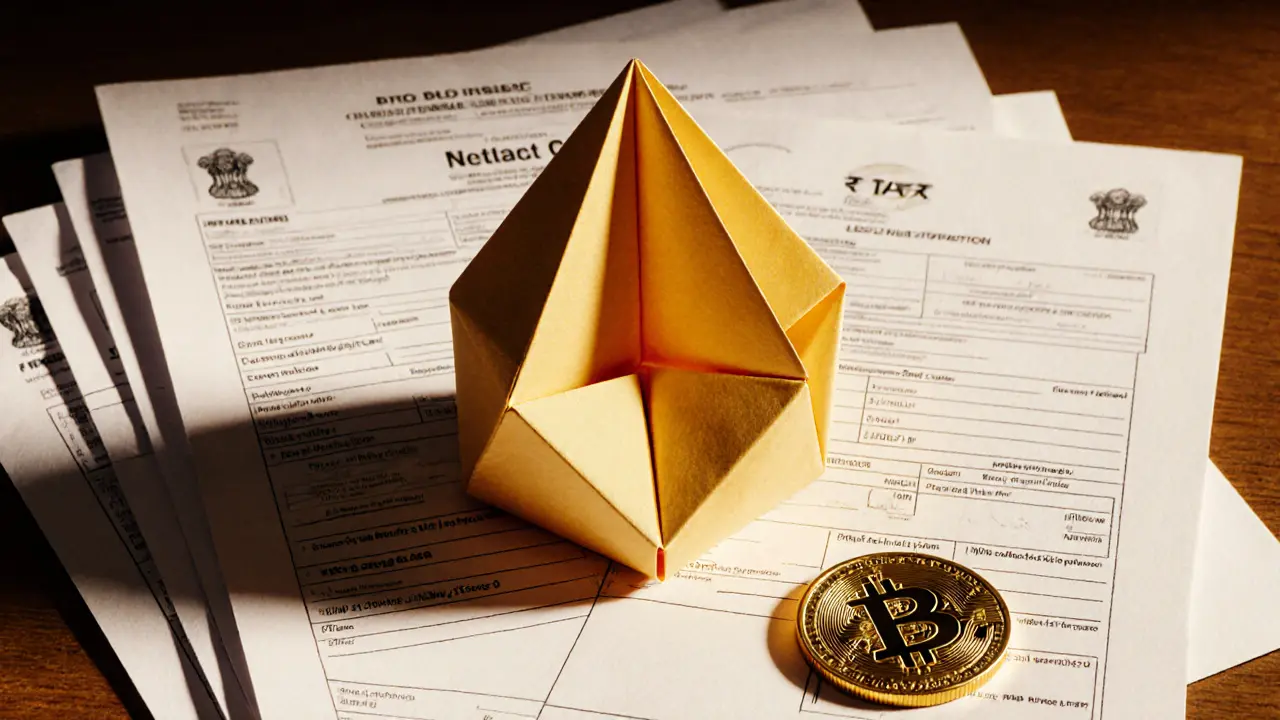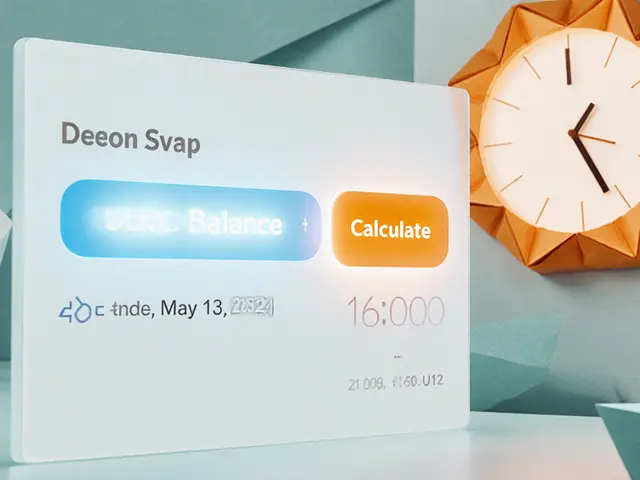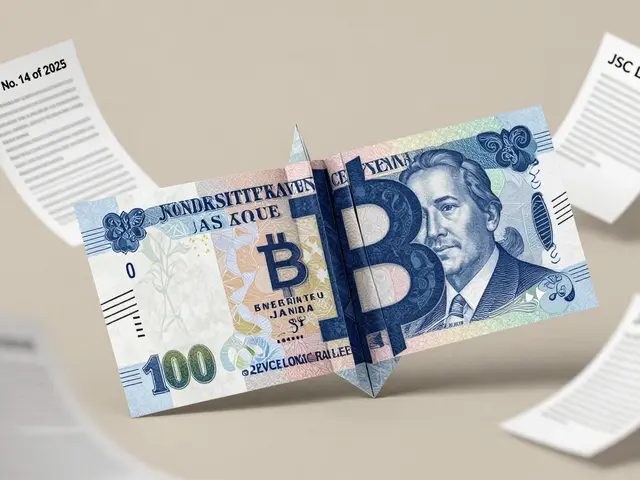India Crypto Tax Calculator 2025
Calculate your net proceeds after India's 30% crypto tax, 1% TDS, and 18% GST. Input your purchase and selling price to see the total tax burden.
Results
India doesn’t ban cryptocurrencies, but it doesn’t exactly welcome them either. As of 2025, you can buy, sell, and hold Bitcoin, Ethereum, and other digital assets - but the government treats them like high-risk investments, not money. If you’re trading crypto in India, you’re navigating one of the strictest tax and compliance systems in the world. Here’s what you actually need to know.
Bitcoin and crypto are legal - but not as money
You can legally own cryptocurrency in India. There’s no law saying you can’t hold Bitcoin or trade altcoins. But here’s the catch: they’re not legal tender. That means no business is required to accept Bitcoin as payment for goods or services. If you try to pay your rent in Ethereum, your landlord can say no - and they won’t be breaking any rules. Only the digital rupee, the central bank digital currency issued by the Reserve Bank of India, has legal tender status.
The government calls these assets Virtual Digital Assets (VDAs), not cryptocurrencies. That label matters. It signals that the state sees them as property, not currency. You can’t use them to pay taxes, settle debts, or buy government bonds. They exist in a legal gray zone: allowed for investment, blocked from everyday use.
The 30% crypto tax - and why it’s crushing traders
India’s crypto tax rules are among the harshest anywhere. Any profit you make from selling Bitcoin, Ethereum, or even an NFT is taxed at a flat 30%. No deductions. No loss offsets. Even if you lost money on other trades, you can’t use those losses to reduce your tax bill.
Here’s how it works: You buy 1 BTC for ₹30 lakh. A year later, you sell it for ₹45 lakh. Your profit? ₹15 lakh. You owe ₹4.5 lakh in taxes - no matter how long you held it. Compare that to the U.S., where long-term capital gains on crypto can be taxed as low as 0% or up to 20%, depending on income. In India, it’s always 30%.
Then there’s the 1% TDS. Every time you sell crypto on an exchange - even if you’re breaking even - the platform must deduct 1% of the total transaction value and send it to the government. So if you sell ₹10 lakh worth of crypto, ₹10,000 gets taken before you even see your money. If you trade frequently, this adds up fast. Many users report paying more in TDS than their actual profits.
On top of that, Bybit and other exchanges now charge an 18% GST on all trades - spot, margin, staking, even withdrawals. That’s not income tax. That’s a sales tax on the transaction itself. Combine the 30% income tax, 1% TDS, and 18% GST, and you’re looking at over 49% in total tax on a single trade. No other major economy does this.

Who’s watching you - and how
It’s not just about taxes. The government has built a surveillance system around crypto. Since March 2023, every exchange, wallet provider, or crypto service operating in India must register with the Financial Intelligence Unit-India (FIU-IND) under the Prevention of Money Laundering Act. That means you can’t use an offshore exchange without jumping through compliance hoops.
Exchanges now require full KYC: your ID, address, PAN card, and even proof of source of funds. They monitor your trades, flag suspicious activity, and report it to authorities. If you’re moving large sums between wallets or using peer-to-peer platforms, you’re still in the system. The government can trace those transactions.
And now, SEBI is in the game. Since April 2025, tokens that act like securities - think tokens offering profit-sharing, dividends, or equity-like rights - fall under securities law. That means some DeFi tokens, yield farms, and tokenized assets could be treated like stocks. Violations could mean fines or criminal charges.
What happened in 2020 - and why it still matters
Before 2020, India’s crypto scene was nearly dead. In April 2018, the Reserve Bank of India banned banks from serving crypto businesses. No bank accounts. No UPI. No withdrawals. Exchanges shut down. Traders were stuck.
Then came the Supreme Court judgment in March 2020. The court ruled the RBI’s ban was unconstitutional. It wasn’t proportional. It wasn’t based on evidence. The decision restored access to banking services and revived the market. Today, over 107 million Indians hold crypto - the third-largest user base globally, after the U.S. and Nigeria.
That ruling didn’t make crypto legal tender. It didn’t stop taxes. But it did prevent a full ban. That’s why today’s system is so complicated: the government allows crypto to exist, but makes it so expensive and regulated that most people treat it as speculation, not spending money.

What’s next? The 2025 signals
The government hasn’t given up on control. In June 2025, officials promised a discussion paper on a new crypto framework. It hasn’t been released yet. But insiders say it could clarify three big questions:
- Are DeFi protocols legal? Can you lend crypto on Aave or Compound without breaking rules?
- How are staking rewards taxed? Are they income? Capital gains? Something else?
- Will custody services be regulated? Who’s allowed to hold your crypto for you?
India is also preparing for a Financial Stability Board (FSB) peer review in October 2025. That means pressure to align with global standards - possibly lowering some barriers. But don’t expect a tax cut. The government collected over ₹1,200 crore in crypto taxes in FY 2024-25. That’s a big revenue stream.
Meanwhile, the digital rupee is being tested. The RBI wants a state-backed digital currency that’s traceable, secure, and controlled. That’s the real goal: replace private crypto with a government version.
What this means for you
If you’re an investor: Keep detailed records. Track every buy, sell, swap, and staking reward. Use tax software designed for Indian crypto rules. Don’t assume your exchange will do it for you. Most don’t.
If you’re a trader: Be aware that TDS hits on volume, not profit. High-frequency trading can wipe out your gains before you even cash out. Consider using decentralized exchanges - but know that you’re still liable for taxes.
If you’re a business: Don’t accept crypto as payment unless you’re ready to handle GST, TDS, and income tax on every transaction. The compliance cost may outweigh the benefit.
If you’re thinking of starting a crypto project: The regulatory burden is high. Many developers have moved to Singapore, Dubai, or Portugal. India’s ecosystem is growing - but the cost of compliance is pushing innovation offshore.
The truth? Crypto in India is a paradox. The people are here - millions of them. The tech is here. The interest is real. But the system is designed to discourage use, not enable it. You can trade. You can hold. But you’re paying a heavy price for the privilege.
Is it legal to buy Bitcoin in India in 2025?
Yes, it’s legal to buy, sell, and hold Bitcoin and other cryptocurrencies in India. They are classified as Virtual Digital Assets (VDAs) under the Income Tax Act. However, they are not legal tender, meaning businesses aren’t required to accept them as payment.
What is the crypto tax rate in India?
All gains from cryptocurrency transactions are taxed at a flat 30%. There are no deductions for expenses or losses. Additionally, a 1% Tax Deducted at Source (TDS) applies to all crypto transfers above ₹50,000 (or ₹10,000 in a single day). An 18% GST is also charged on transaction fees by exchanges like Bybit, making the effective tax burden exceed 49% on some trades.
Do I have to report crypto on my tax return?
Yes. All cryptocurrency gains must be reported under the head "Income from Other Sources" in your annual income tax return. You must maintain records of all transactions, including dates, amounts, and transaction IDs. Failure to report can lead to penalties, interest, or even prosecution under the Income Tax Act.
Can I use crypto to pay for goods in India?
Technically, yes - if both you and the seller agree. But it’s not legal tender. The seller can refuse payment in crypto without breaking any law. Only the digital rupee, issued by the Reserve Bank of India, has legal tender status. Most businesses avoid crypto payments due to tax and compliance risks.
Are crypto exchanges regulated in India?
Yes. All crypto exchanges and service providers must register with the Financial Intelligence Unit-India (FIU-IND) under the Prevention of Money Laundering Act. They must implement KYC, monitor transactions, report suspicious activity, and collect 1% TDS on sales. Many international exchanges have blocked Indian users because compliance is too costly.
What happens if I don’t pay crypto taxes in India?
You risk penalties, interest, and legal action. The Income Tax Department can match your crypto transaction data with bank records and exchange reports. Unreported gains can lead to tax reassessments, fines up to 200% of the tax due, and even prosecution for tax evasion under Section 276C of the Income Tax Act.
Is staking crypto taxable in India?
Yes. Staking rewards are treated as income and taxed at 30% when received. The government has not clarified whether they should be taxed as ordinary income or capital gains, but current practice treats them as taxable income at the time of receipt. You must report the fair market value in INR on the day you receive the reward.
Can I use a foreign crypto exchange in India?
You can, but it’s risky. Foreign exchanges aren’t required to comply with Indian tax or KYC rules. However, you’re still legally responsible for reporting all gains to the Indian tax authorities. Using offshore platforms doesn’t exempt you from tax. The government can track your transactions through bank transfers and blockchain analysis tools.





Suhail Kashmiri
Bro, this whole system is just state-sanctioned robbery. You buy crypto, you hold it, you actually make money - and the government takes nearly half just for existing. No other asset class gets taxed like this. It’s not regulation, it’s punishment. And they wonder why people use P2P or offshore exchanges? Because they’re not stupid.
Kristin LeGard
India’s crypto policy is a joke. You tax people at 30% but don’t let them use it as money? That’s not policy - that’s performance art. Meanwhile, the U.S. lets people invest and spend. Europe has clear rules. India? You’re just a tax farm with Wi-Fi. And don’t even get me started on the 1% TDS on every single trade - it’s like charging a toll every time you breathe.
Arthur Coddington
Let me ask you something: if crypto is just a ‘Virtual Digital Asset’ and not money, why does the government care so much? Why the surveillance? Why the TDS? Why the GST on every swap? They don’t want you to succeed. They want you to think it’s too hard. That’s not regulation. That’s psychological warfare. And honestly? It’s working. I’ve seen friends quit. Not because they lost money - because they lost hope.
Phil Bradley
Remember when people said crypto was dead in India after the 2018 bank ban? Then the Supreme Court said ‘nah, that was illegal’ and boom - 107 million users. The government didn’t stop it. They just made it expensive. And now they’re taxing staking rewards like they’re your salary? That’s not innovation. That’s fear. They’re scared of decentralization. They want control. And they’re willing to crush an entire generation of tech-savvy Indians to get it.
Stephanie Platis
Let’s be precise: the 30% tax on capital gains is not ‘flat’ - it’s confiscatory. Furthermore, the 1% TDS applies to the entire transaction value - not profit - which means you’re paying tax on your principal if you break even. And the 18% GST on exchange fees? That’s a regressive sales tax on financial services - a category explicitly exempt in most jurisdictions. This is not a tax regime. It’s a regulatory landmine.
Michelle Elizabeth
It’s funny - the government calls it ‘Virtual Digital Assets’ like that makes it sound less real. Like if you name something ‘digital potato,’ it stops being a potato. But people aren’t buying ‘VDAs.’ They’re buying Bitcoin. They’re staking Ethereum. They’re building DeFi apps. The labels don’t change the tech. They just make the paperwork uglier. And honestly? The real innovation isn’t in the exchanges - it’s in the people who still show up despite the chaos.
Joy Whitenburg
Okay but like… why is everyone so mad? I get it, the taxes are wild. But I’ve been trading since 2021 and I’ve still made more than my day job. Yeah, I pay 49% in taxes - but I still walk away with cash. Maybe the system’s broken… but it’s not broken enough to stop me. I just use CoinSwitch and keep receipts. And I don’t cry about it. I just trade smarter.
Kylie Stavinoha
India’s approach to crypto reveals a deeper tension: between modernity and control. The people have embraced blockchain as a tool of financial autonomy. The state sees it as a threat to monetary sovereignty. The digital rupee isn’t just a competitor - it’s a replacement. And until the government recognizes that trust in crypto comes from decentralization - not taxation - they will continue to alienate the very users they claim to protect.
Diana Dodu
Let’s be real - this isn’t about taxes. It’s about power. The RBI doesn’t want people holding assets outside their control. The government doesn’t want citizens using untraceable money. They’re terrified of losing their monopoly on value. And they’re using tax laws like weapons. Every 1% TDS, every GST, every KYC form - it’s not compliance. It’s coercion. And they’re winning. Because most people just give up.
Raymond Day
30% tax + 1% TDS + 18% GST = 49%? Bro, that’s not a tax rate - that’s a death sentence for traders. 😭 I used to make 5 trades a day. Now I make one a week. Why? Because the TDS eats my profits before I even see them. And don’t even get me started on the ‘source of funds’ checks. I had to send my bank statements to Bybit like I was applying for a mortgage. This isn’t finance. It’s surveillance capitalism with a side of bureaucracy.
Noriko Yashiro
I’m British but I’ve watched this unfold. India’s crypto scene is one of the most vibrant globally - and yet, the policy is so hostile it’s almost poetic. Imagine if France taxed every coffee purchase at 49% just because it wasn’t brewed by a state-approved barista. That’s what this is. Innovation shouldn’t be punished. It should be guided. But here? It’s being suffocated.
Atheeth Akash
My uncle in Delhi bought BTC in 2021. Sold it last year. Paid taxes. Didn’t complain. He just said, ‘If the government wants to take it, I’ll give them half. But I kept the rest.’ That’s the Indian spirit. You don’t fight the system. You work around it. And honestly? That’s why crypto’s still alive here.
James Ragin
Who do you think is behind this? The IMF? The World Bank? The same people who pushed the digital rupee? They don’t want decentralized money. They want total control. Every KYC, every TDS, every flagged wallet - it’s all part of a global surveillance architecture. And India? They’re the perfect lab. 1.4 billion people. Low crypto literacy. High trust in authority. Perfect conditions for a financial dictatorship. Don’t be fooled - this isn’t about revenue. It’s about control.
Michael Brooks
Here’s the truth no one talks about: the 30% tax is actually a feature, not a bug. It filters out the amateurs. The people who can’t track their trades, who don’t keep records, who think crypto is a lottery - they get burned. The ones who survive? They’re the serious ones. The ones who use CoinTracker, who file ITR-2, who understand capital gains. The tax isn’t punishing crypto. It’s punishing carelessness. And honestly? That’s not a bad thing.
David Billesbach
They’re not just taxing crypto - they’re weaponizing accounting. The 1% TDS? That’s a digital fingerprint. Every transaction is logged. Every wallet is tracked. Every bank transfer is flagged. And now SEBI is coming for DeFi? They’re not regulating. They’re erasing. The moment you use a smart contract, you’re in their crosshairs. This isn’t capitalism. It’s crypto apartheid. And the digital rupee? That’s the final nail. It’s not money - it’s a leash.
Andy Purvis
I get why people are angry. But maybe we’re asking the wrong question. Instead of ‘why is India so harsh?’ maybe we should ask ‘why are we still here?’ Millions of Indians are still trading, building, investing - despite the cost. That’s not a failure of policy. That’s a triumph of human curiosity. Maybe the system’s broken. But the people? They’re not.
FRANCIS JOHNSON
This isn’t just about crypto. It’s about freedom. The ability to choose your money. To move it without permission. To build without asking for a permit. India’s system says: ‘You can own this - but only if you beg for approval at every step.’ That’s not progress. That’s surrender. And yet - people still show up. Still trade. Still believe. That’s the quiet revolution. No banners. No marches. Just wallets. And receipts. And hope.
Ruby Gilmartin
Let’s not romanticize this. The 107 million users? Most are retail speculators who don’t understand blockchain, tax law, or risk. They’re gambling. And the government is profiting from their ignorance. The 30% tax isn’t punitive - it’s a revenue stream from financial illiteracy. And the TDS? It’s a forced savings account for the state. This isn’t regulation. It’s exploitation dressed up as policy.